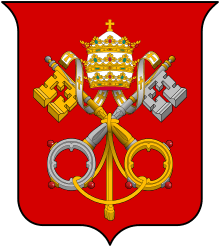Holy See–European Union relations
 | |
EU |
Vatican City |
|---|---|
Holy See-European Union relations is the relationship between the European Union (EU) and the Holy See (or Vatican City).[1] This is framed by the Holy See's geography (within an EU state capital) while being unable to join.
Cooperation
According to the EU's Copenhagen criteria which define what states are eligible to join the EU, a candidate state must be a free market democracy. Given that the Holy See is an elective and polysinodyc monarchy, with only one major economic actor (the state itself) it does not meet the criteria. However, as it is so small, and surrounded by an EU state (Italy), it is intrinsically linked to the EU. Vatican City has an open border with the EU and intends to join the Schengen Information System. It also uses the euro as its sole currency and has an agreement with the EU allowing them to mint their own coins.[2] The EU gave Italy authority to negotiate a deal with the Holy See in 2000 which allowed the Holy See to mint a maximum of €670,000. After a review of the arrangements, a new agreement came into force in 2010 which allowed the Holy See to mint €1 million a year (plus up to an additional €300,000 on special occasions).[3]
Vatican City is not part of the EU's customs union or its VAT area like some other small European states are. However Vatican City is exempt from duties and taxes and the small amount of goods exported from Vatican City are exempt from duty.[2]
Representations
The first representative from the Holy See, an Apostolic Nuncio, was accredited to the EU in 1970. The role of the EU's representative to the Holy See is accorded to the EU representative to the UN in Rome:[2] currently Ambassador Yves Gazzo. The first EU representative to the Holy See was Luis Ritto, accredited in 2006. This accreditation followed a visit by Commission President José Manuel Barroso who wished to create open full diplomatic relations between the two.[3]
Points of tension
Some of the more recent events in the relationship have been;
- A disagreement over whether to include a reference to Europe's Christian heritage in the European Constitution[4]
- The European Parliament refused to ratify Rocco Buttiglione as a European Commissioner because he backed the Catholic Church's view on homosexuality[5]
- The European Union endorsed the Sandbaek Report, increasing funding for abortion[6]
- The funding of stem cell research by the European Union[7]
- The European Parliament passed a motion[8] calling for the compulsory recognition of same-sex unions across the European Union[9]
Membership
The Vatican City (the smallest state in the world[10]) is an ecclesiastical[10] or sacerdotal-monarchical[11] state, and as such does not have the democratic credentials to join the EU (Art. 49 TEU) and is unlikely to attain them given its unique status. Additionally its economy is also of a unique non-commercial nature. Overall, the mission of the Vatican City state, which is tied to the mission of the Holy See, has little to do with the objectives of the EU Treaty.[12] Thus EU membership is not discussed, even though it is in the heart of an EU member state.[12]
Apostolic Nuncios
- Igino Eugenio Cardinale (10 Nov 1970 - 24 Mar 1983)
- Angelo Pedroni (6 Jul 1983 - 13 Jun 1989)
- Faustino Sainz Muñoz (21 Jan 1999 - 11 Dec 2004)
- André Pierre Louis Dupuy (24 Feb 2005 - 15 Dec 2011)
- Alain Paul Charles Lebeaupin (23 Jun 2012 - )
See also
References
- ↑ The Holy See and the State of the Vatican City are not synonymous, however the ultimate authority of each in terms of international relations have the same impact in terms of the topics discussed in this article
- 1 2 3 Holy See (Vatican), European External Action Service
- 1 2 Work with the Holy See, EU delegation in Rome
- ↑ "BBC NEWS - Europe - Pope presses EU on constitution". Retrieved 17 April 2017.
- ↑ "BBC NEWS - Europe - EU row candidate stands down". Retrieved 17 April 2017.
- ↑ EU funds must not be used for abortions in developing countries, Commission of the Bishop's Conferences of the European Commission, Press Release, 13 February 2003
- ↑ "Roman Catholic Church Outraged at EU Stem Cell Funding Decision - Christian News on Christian Today". Retrieved 17 April 2017.
- ↑ "Texts adopted - Wednesday, 14 June 2006 - Non-discrimination and equal opportunities for all - P6_TA(2006)0261". Retrieved 17 April 2017.
- ↑ European Parliament calls for legal recognition of same-sex unions in all EU states, 27 June 2006, euro-fam
- 1 2 "Holy See (Vatican City)". CIA—The World Factbook. Retrieved 13 August 2013.
- ↑ "Vatican City". Catholic-Pages.com. Archived from the original on 22 September 2013. Retrieved 12 August 2013.
- 1 2 "EU Enlargement and the Failure of Conditionality" (European Monographs #59), by Dimitry Kochenov, Kluwer Law International, 2008, p. 25
